Takeaways from #Story25: Day 1
Check out the main highlights from the first day of our anniversary edition.
A pencil, emotional audio tape, cooked data. These are just some of the sparks that tied together the first day of #Story25. Scroll down to read how the day went.
Jacqui Banaszynski
After 50 years in journalism and 5,000-plus bylines, Pulitzer-winning reporter and editor Jacqui Banaszynski revisited a question that feels more urgent than ever: Do we, as storytellers, matter? And if yes, how? In the process, she also gifted every one of us a pencil, to serve as the reminder of the power held by the written word.
I have built my life on words—words read, words studied, words spoken, words regretted. As much as I believe in anything, I believe in their power.
Throughout my career, I discovered my superpower: It certainly wasn't writing—it still isn't. It wasn't confidence—it still isn't. It was working hard and showing up.
As you hold your pencils, I hope you remember that what you say matters, and that listening to others has even greater power.
Consider the famous quote History is written by the victor. That philosophy centers the idea that those in power determine the narrative, what stories are told and who the heroes of those stories are. (…) But we can control our own narratives. It's why journalists need to record history as it unfolds even if no one is listening. It's why you need to record your own lives.
There are no metrics that measure the impact on the human heart.
The stories I championed as a writer did not drive traffic. They were always human stories, always emotional, often long. They captured the daily realities of humans navigating life. (...) We can only tell those stories with the trust, the faith, that they matter. They don't just record bits of history, they record bits of our soul. And that is the true power of the pencil.
Amanda Ripley
Drawing on the insight that facts, argument and investigative reporting often end up fueling conflict rather than solving it, conflict mediator Amanda Ripley shared what she has learned from years of following conflict survivors and experimenting with, as she calls them, “counterintuitive” ways to cover our divides.
Every time you divide humans into two groups, especially when one thinks they’re better than the other, it turns into conflict.
Conflict is not the problem. We need conflict. Up in space and down on Earth, it’s how we push and challenge each other. (…) The problem is that we are surrounded by high conflict.
Common fire starters are humiliation, corruption, binary group identities and conflict entrepreneurs. Humiliation is driving every conflict we are in—so look for it, as journalists, as storytellers. Think about how we are humiliating people at scale.
Any intuitive thing you do to fight the conflict, will make it worse. We cannot trust our intuition. So how do we interrupt this madness? By doing counterintuitive things, which does not come naturally.
We need to investigate functional conflict with the same rigor that we bring to the dysfunctional conflict.
We give conflict entrepreneurs the microphone, they say outrageous things and then we repeat it a million times. What if we amplified the exhausted majority instead? Our impulse is journalists is to identify the villain. Then what? Try to figure out what we are really fighting about.
Jacopo Ottaviani & Piero Zagami
What happens when a graphic designer and a data journalist meet in Beirut and decide to join forces? First, as Jacopo & Piero shared, they become friends. Then, they start working on data projects that break down barriers and build understanding.
Behind every data point lies a human story—we don’t just analyze numbers, we strive to uncover the voices, experiences and lives they represent.
If you're a journalist or data designer, remember that data and numbers don’t speak for themselves. You are the author and you have to give them a voice, you have to let them speak. Data points the way, but your voice gives it direction.
Data jouralism can be boiled down to one process: the main ingredient is data— you have to find the data—, then you filter it, visualize it, and turn it into a story. Once you get to the story, you get the maximum value for the public.
You have to be aware that data can be weaponized. There is an ongoing war in terms of information, polarization, and data plays a role. It can be manipulated just like images are. (…) We believe in using data storytelling for good: as a tool to communicate crucial information, inspire action, and drive positive change in the world.
My story is ultimately about pain and privilege: By digging data, you get to see a lot of pain in the world. You find a lot of suffering. But you also find a lot of joy. And the privilege part? I'm privileged to be here, to tell you the story, and to have found this direction in my career. If you use it like this, data can also help you figure out who you are.
Ruxandra Gîdei
Seeing as more and more books are being banned, especially in the United States, bookish content creator and literature advocate Ruxandra Gîdei shared why she thinks we might be underestimating literature’s power to both connect and disrupt the status quo. And, with the help of fellow book enthusiasts, she also showed us how we can empower others in discovering the transformative power of literature.
If it were true that we are heading towards a future where reading and literature don’t matter, it if were true that the connections we make through literature didn’t leave at least a dent in the world, then why would books be seen as such a threat?
Books are still dangerous. The little spark in the mind of a 15-year-old girl reading The Handmaid’s Tale is still dangerous.
Reading threatens power structures built on the illusion of singular truth. It refines our curiosity, it encourages us to stand with contradiction and read between the lines of the world, which we all so direly need.
The more books you read, the easier it is to spot the biases within them. This ability extends beyond literature. This is what, for example, helps me navigate workplace politics, and, on a personal level, it is what helped me reconnect with people, like my mother.
I don’t think we can afford to treat literature as an afterthought. Even if you are already convinced, maybe you should keep making noise about the power of books and this common sense knowledge that is becoming less common sense. (…) Social bubbles and online activism are not enough, as long as we don’t have structural support. But we can still try being louder.
Chris Wiggins
Chris Wiggins, Professor at Columbia and Chief Data Scientist at The New York Times, unpacked the history and technology behind “persuasion at scale”—the systems that scale influence in the age of big data and AI. All this, starting from Kranzberg's first law of technology, which states that technology is neither good nor bad, nor is it neutral.
Technology is not magic and the people who do it are not magicians, but every choice behind a technology has an impact.
Companies that have digital assets know there is money to be made by understanding human beings, by understanding which stories to be served to which people.
From a science perspective, it’s difficult to prove from the outside if the changes companies like Facebook or TikTok are making actually persuade us. From an engineering perspective, though, it is proven. You are being persuaded all the time. The only person who is not persuaded at scale is the one who doesn’t have a phone and never opened a computer.
The best we can do as technology is to push for and demonstrate reflexivity and transparency.
I urge you to double down on sense-making and to continue to believe in truth.
Alison MacAdam
Editor Alison MacAdam has spent the past 25 years working in audio storytelling, and in her talk, she helped sort through the rubble of an industry currently flooded by celebrity chat shows, mass-producing true crime and, funnily enough, video content. While digging and sorting, she asked a crucial question: What do deeply-reported, time-intensive audio stories actually do with us?
We get told podcasting is huge, but it’s not clear what we’re saying is huge. We have an entire industry formed around this word without a coherent definition. It has been stretched so wide it is almost meaningless.
Audio journalists are living with a dangerous mismatch: we helped create the podcasting industry, but the industry doesn’t want us. It’s an industry, and it’s focused on entertainment. This industry is pouring more and more money into content that divides us, that disinforms us.
What I can do is make a plea: don’t give up. Don’t give up on narrative audio, investigative audio. The substance and the storytelling—we still desperately need it. It can help us feel connected.
One thing audio does: it creates empathy. It’s also good at calling bullshit. Sometimes we call that fact-checking. Audio is intimate—our subjects are really just people, and audio does a great job of reminding us of that.
Don’t believe that the only thing worth making is about celebrities or crime or divisive politics.
Photos by Mihai Ciobanu & Tudor Pană.


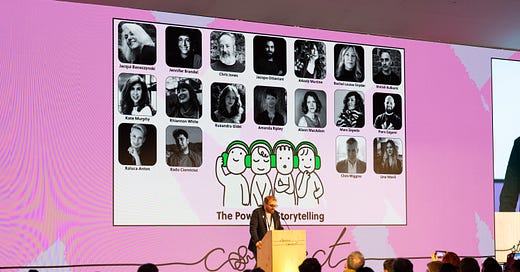


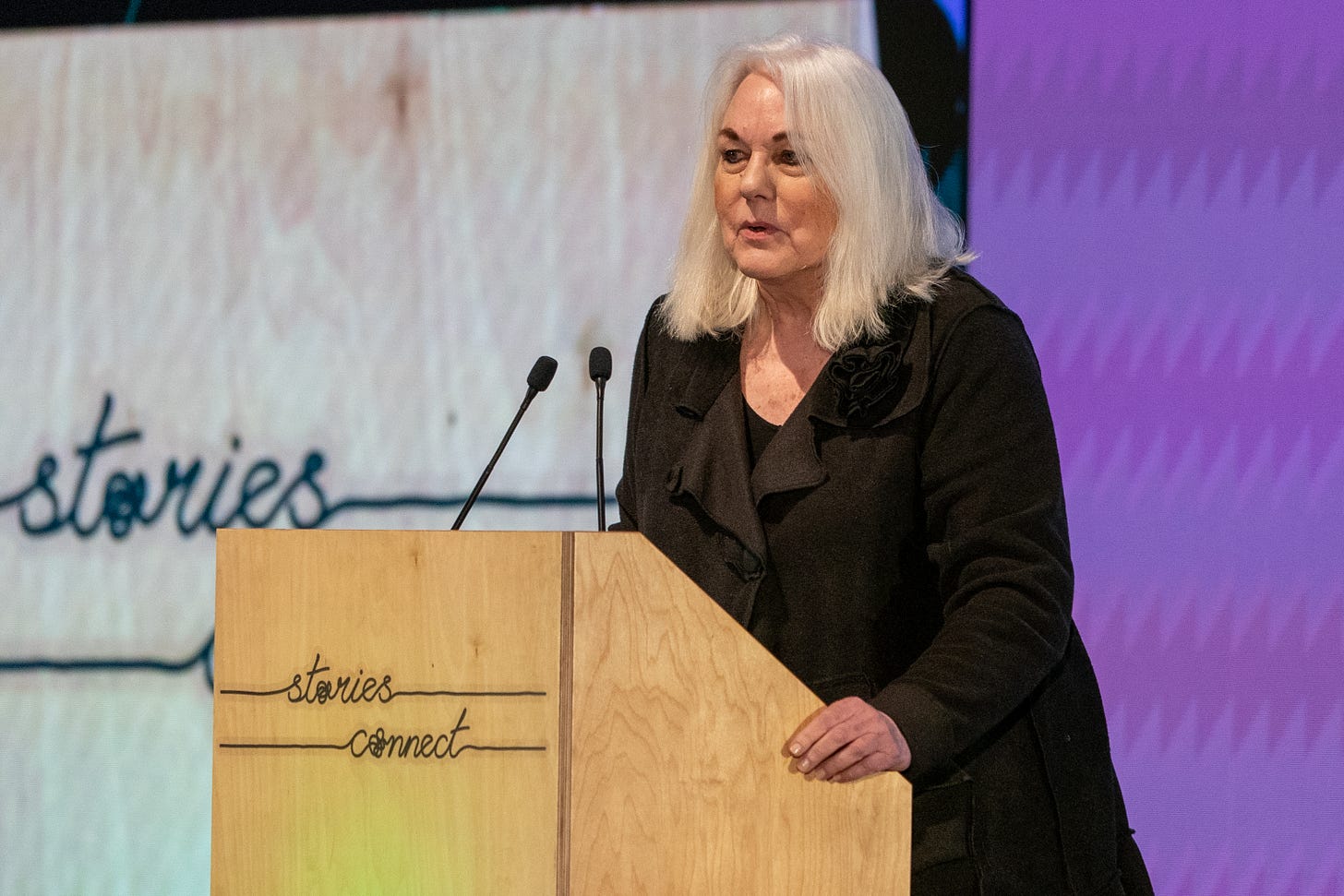

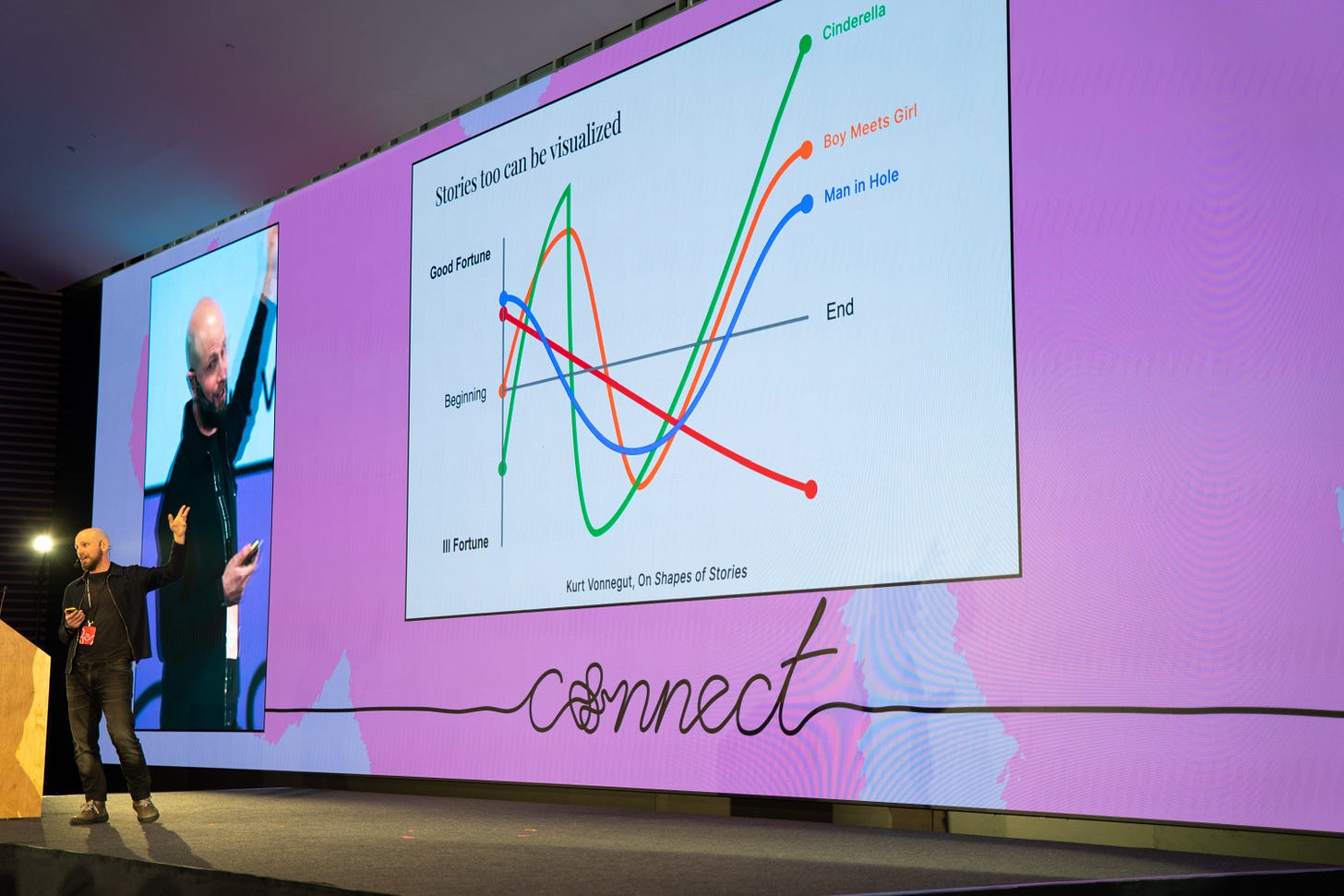
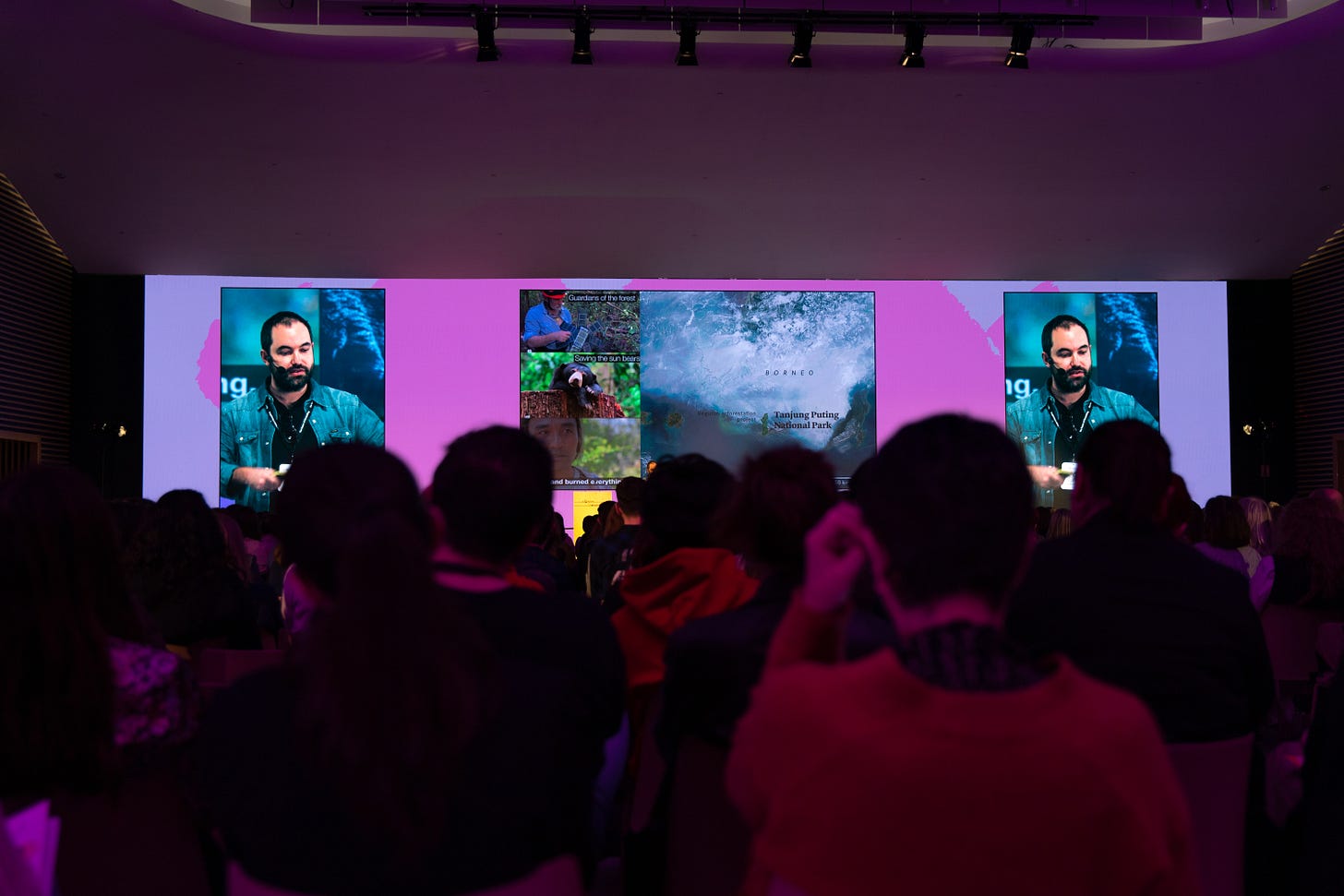
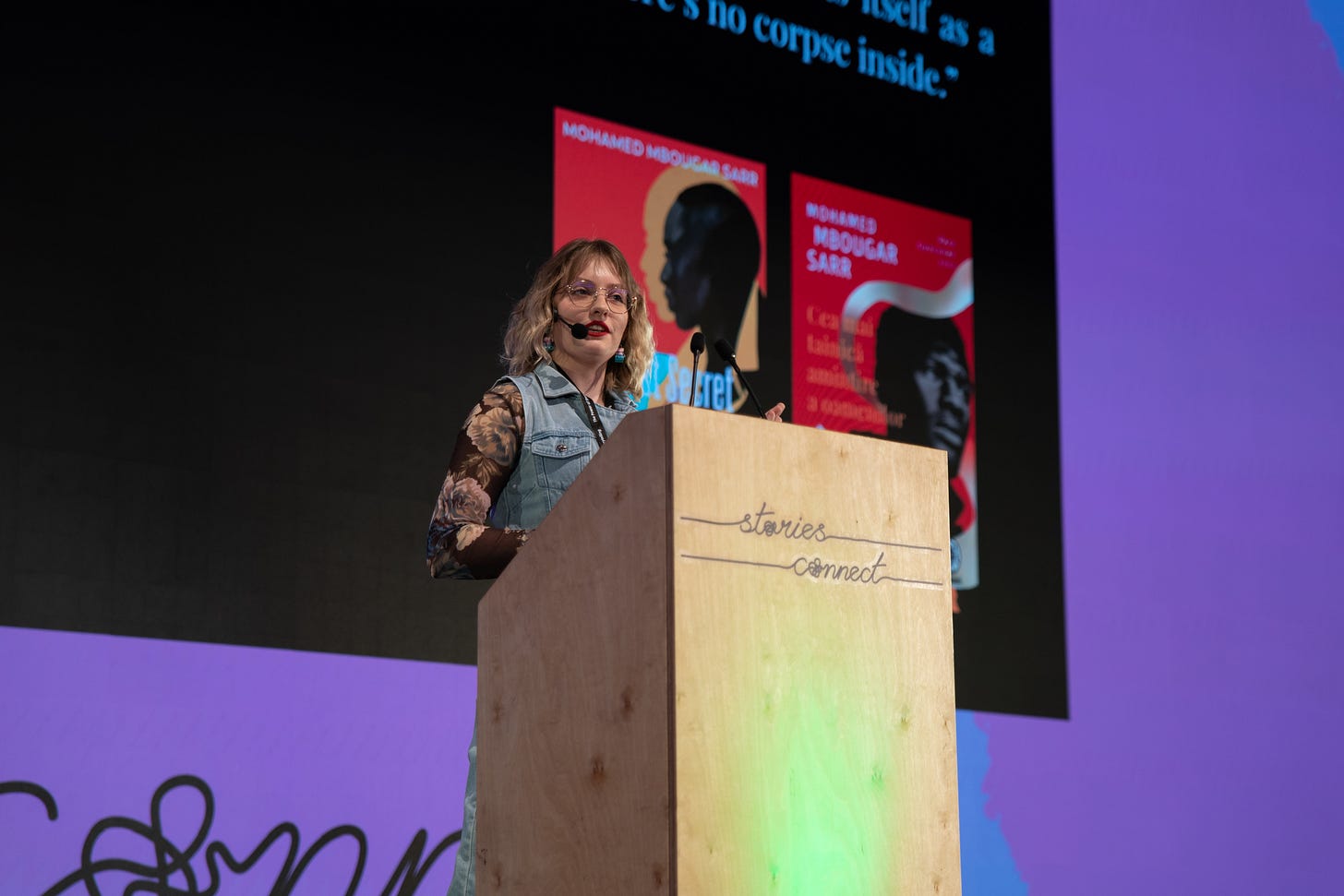
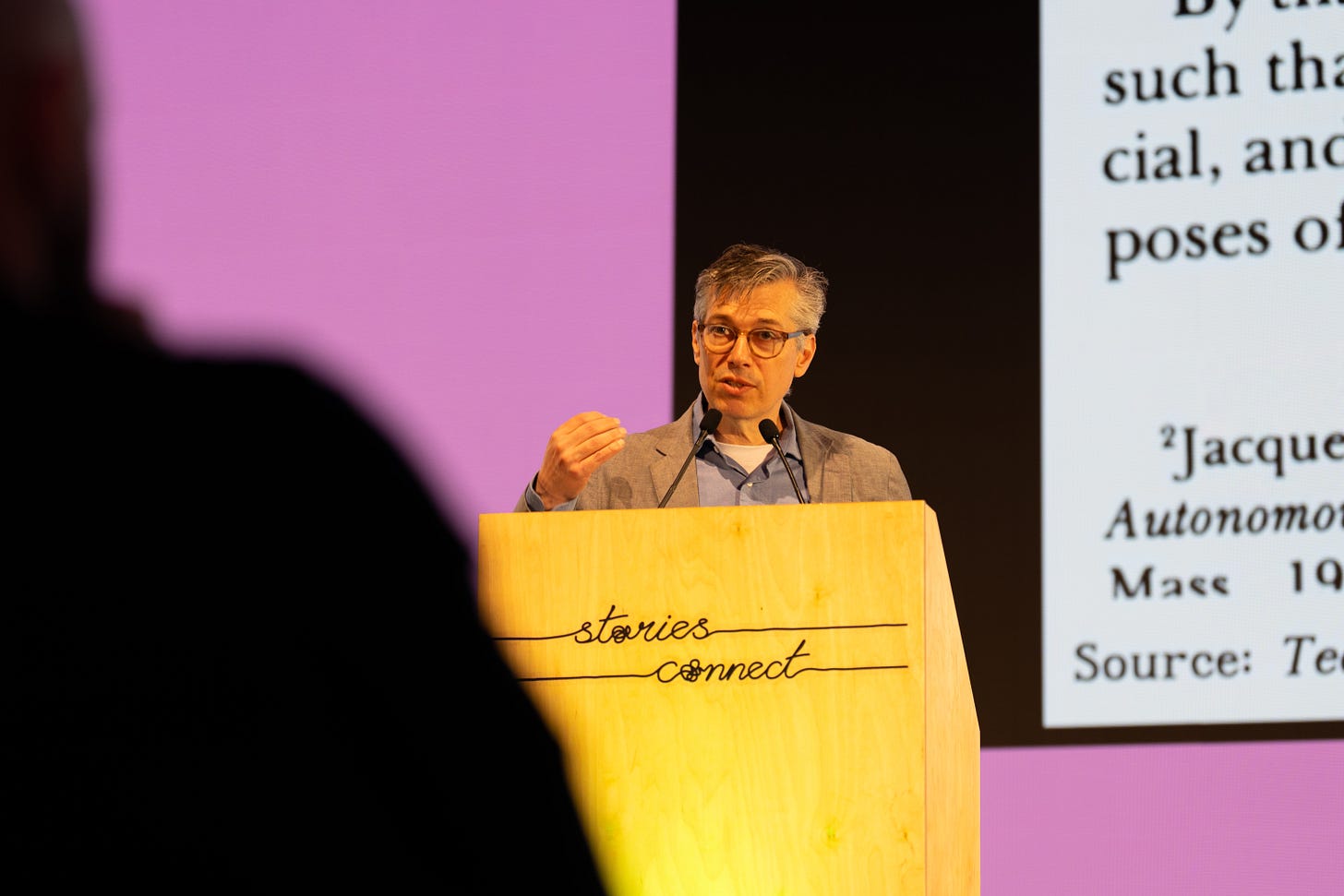

Storytelling is to communicate with each other, to communicate to is to connect and human connection results from a desire to belong. Whereas conflict stakes the position in holding tightly to what matters, to fear of losing the connection or belonging. Although most is human greed. While conflict has been painfully, instrumental in shaping the world as it’s become, violent conflict only demonstrates DNA traits we no longer need with the evolution of connection and communication. With the technology, science, academia, creativity and ability to share it all, violence is not required. Why storytellers will always be needed.
Thanks for the takeaways, it's really useful! :)